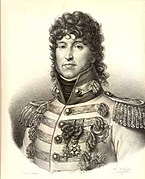Schrift: größer/kleiner
Inhaltsverzeichnis
Sie sind hier: WirRheinländer > english version > The Rhineland under the French (1794 - 1813) > French becomes "populaire"
The Rhineland under the French (1794 - 1813)
French becomes "populaire"
The process of integrating the Rhineland into the French state made rapid progress, particularly because the economic bourgeoisie recognized the advantages of the French system (certainty of legal rights, freedom of trade and commerce, improved opportunities for exports). The Jews also received their state citizenship, at last having equal status with the rest of the population, even though certain special regulations continued to apply to them.
The political-military hegemony of France made many French terms „populaire" in the Rhineland and thus extended the already considerable stock of French loanwords from the seventeenth century. French found its way into all areas of life. Although it was the language of the occupiers, its "flair" of education, elegance and sophistication was appreciated by citizens and the aristocracy. In their ears the "charm" of its melodious sound contrasted pleasantly with rustic peasant dialects. In the Rhineland French was "en vogue". This borrowed phrase is a good example of the new fashion of "parlieren" in Germany, which was part of a tradition. In the late sixteenth century the adaptation "parlieren" had already acquired the meaning of "speaking formally in a refined manner". This reflected the role of France as a pacemaker of baroque culture at the time, when Germany had suffered deeply from the devastation of the Thirty Years' War.
The registration of births, deaths and marriages, carried out at Napoleon's instigation, replaced some German terms used to describe family relations (Ohm/Oheim, Muhme, Vetter, Base) with French words (Onkel, Tante, Cousin, Cousine). The German words Großvater, Großmutter and Großeltern originated during the "time of the French", analogous to the French grand-père, grand-mère und grands-parents. The German equivalents Ahn/Altervater, Ahne/Ahnin/Altermutter and Ahneltern gradually fell out of usage.
However, the French conscription system was a considerable burden for the population, which meant that all male inhabitants between the ages of 18 and 40 were obliged to do military service. It was possible for the materially better-off to be exempted from military duty by providing a substitute instead. In total, the Rhenish population had to pay a heavy toll with their lives in the Napoleonic Wars between 1801 and 1813.
Developments proceeded rather differently on the right bank of the Rhine, which had remained under the rule of the old powers until 1806, although it was partly occupied by the French between 1795 and 1801.

By combining further parts of the areas on the right side of the Rhine with those of Westphalia, the French created the new Grand Duchy of Berg, at first under the rule of Joachim Murat, a brother-in-law of Napoleon, who from 1808 was directly answerable to the Emperor of France. In the Grand Duchy of Berg, which for its part was an integral component of the so-called Rhine Confederation under the Napoleonic Protectorate, integration into the French system was not driven forward to the same extent as on the left bank of the Rhine. Here, too, there was a general duty to do military service, compliance with which increasingly became the actual matter of concern for the French rulers. After the failed military campaign in Russia and the Battle of the Nations at Leipzig (16th-19th October, 1813) the French ruling system in Germany rapidly collapsed. The right bank of the Rhine found itself firmly in Allied hands from the end of 1813, the area left of the Rhine was reconquered by March 1814. In the first Peace Treaty of Paris (30th May, 1814) the Allies agreed to a provisional administration of the Rhenish and Westphalian territories. At the Vienna Congress in April 1815 it was decided that these countries should be permanently under the control of the Prussian Crown.


